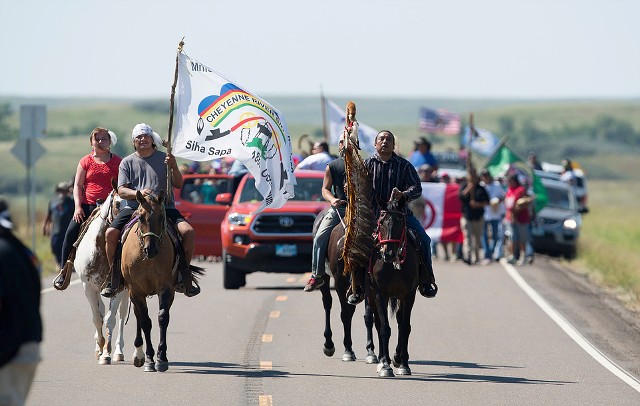A role for unarmed civilian protectors at Standing Rock
 Photo by Chris Juhn“Peace is a daily, a weekly, a monthly process, gradually changing opinions, slowly eroding old barriers, quietly building new structures.”
Photo by Chris Juhn“Peace is a daily, a weekly, a monthly process, gradually changing opinions, slowly eroding old barriers, quietly building new structures.”
~ John F. Kennedy
A few weeks ago, a historical event occurred at Standing Rock. It wasn’t the decision by the Army Corps of Engineers to deny the easement, though that was historic. But something else happened — a ceremony where veterans asked forgiveness from Lakota elders for past wrongs committed by the U.S. military. This was a symbolic gesture that helps to erode old barriers and build new structures for peace. The work that NP civilian peacekeepers do everyday erodes barriers by creating space for dialogue and builds partnership to resolve conflict peacefully. Our teams work in some of the most violent conflicts around the world: South Sudan, Myanmar, the Philippines and Middle East.
As our supporters, you have asked us many times, “When will NP start working in the US?” That time has come. Your help is needed to raise $50,000 for staff and volunteers to provide prospective presence and create space for dialogue.
Earlier this year, Standing Rock’s tribal Chairman David Archambault II made a request to the UN Human Rights Council in Geneva for international recognition and assistance in opposition to the construction of the Dakota Access pipeline. In response, NP sent a two-person team for 14 days to assess how and if unarmed civilian protection could have a positive impact on the situation. In mid November, after much discernment and discussion, NP’s board of directors decided to send an unarmed civilian protection team for a minimum of two months.
Thiago Wolfer from Brazil and Martha Hernandez of Colombia, two of our most veteran civilian protectors, along with Pam Costain, a well-respected Twin Cities based community leader, left for North Dakota just last week. Focusing on the three pillars of our work — nonviolence, nonpartisanship and the primacy of local actors — the team will first meet with a variety of people in the area and begin building relationships.
As with all our missions, we are not taking sides in the conflict and we are not imposing solutions. Rather, through building relationships with all the stakeholders involved in the conflict at Standing Rock, our peacekeepers will work to erode barriers and create space for dialogue.
With the recent decision by the Army Corps of Engineers to deny easement for the Dakota Access Pipeline, the need for civilian protection has shifted from the Standing Rock camps to the cities of Bismarck and Mandan. Tensions are high in these adjacent cities and while hate crimes have increased everywhere in the United States, Native Americans and other people of color are experiencing a major increase of harassment and threats of violence.
Utilizing the experience we have gained in places like South Sudan and Mindanao, the Philippines, the team will assess how the various effective methods of nonviolent civilian protection can be applied in the area. These could include proactive presence, accompaniment, capacity building and creating space for conflicting parties to talk informally. We have been asked to provide protective presence for the legal team representing water protectors who were arrested and charged with misdemeanor and felony offences.
Before the end of the year, NP’s team will begin training volunteers who can commit to at least one week a service. We plan to have a pool of 30 trained volunteers by January 21. And, as with all our unarmed civilian protectors, we will train local people, drawing on the communities of Bismarck, Mandan, Fargo and the Twin Cities, and ensure a diverse group of people.
This project is being funded by individual donations and we have about 40% raised for the first two months. Please consider an additional gift this year gift so that we can sustain our first U.S. based peacekeeping team. The lessons they learn will be invaluable in the coming few years in the U.S. and illustrate that unarmed strategies reduces violence and erodes barriers to create lasting peace.
